Li DENG: Weak-Bonding Catalysis with Organic Molecules
Pei WANG 2020-11-22
On November 19, 2020, Prof. Li DENG, XU Yiming Endowed Chair Professor and the Executive Dean of School of Science, Westlake University was invited to the 43rd Science Lecture in College of Science. He gave a talk on weak-bonding catalysis with organic molecules, which was chaired by Minghua XU, professor of Dept. of Chemistry.
Guest Introduction:
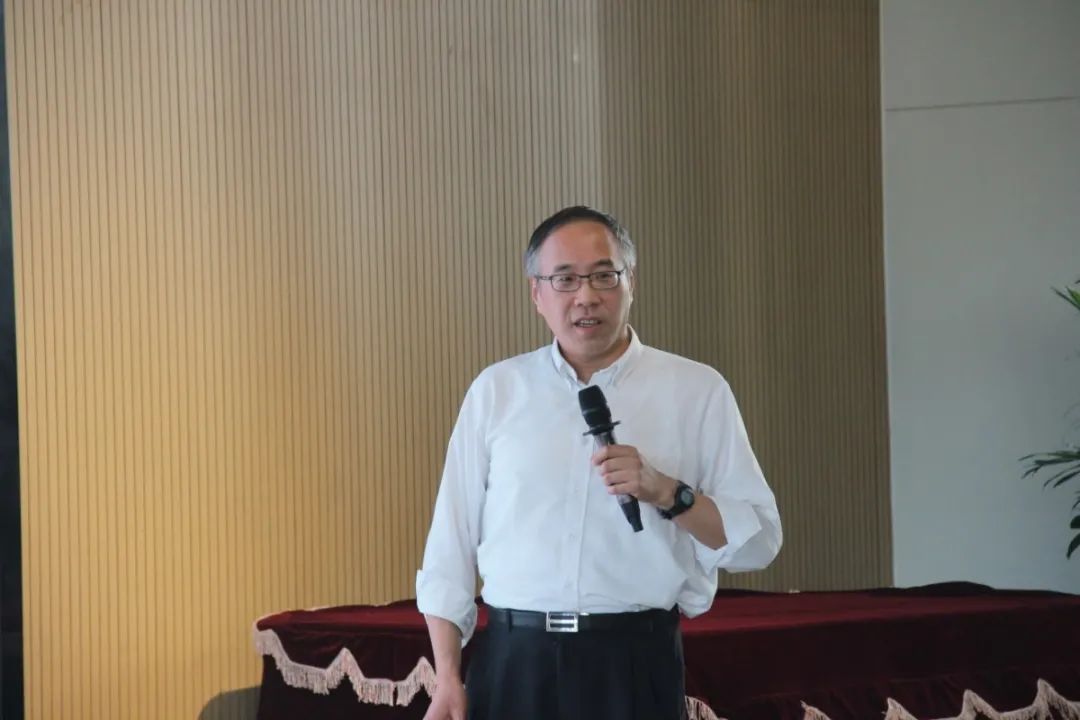
Professor Li DENG received his B.S. degree from Tsinghua University (1987), M.S. degree from University of Wisconsin-Milwaukee (1990), and Ph.D. degree from Harvard University (1995). He carried out his postdoctoral studies at Harvard as an American Cancer Society Postdoctoral Fellow. He joined Brandeis University as an Assistant Professor of Chemistry in 1998. He was promoted to Associate Professor with tenure in 2003, to Full Professor and was named the Orrie Friedman Distinguished Professor of Chemistry in 2005. He served as the Chair of the Chemistry Department at Brandies University from 2011 to 2014. He joined Westlake University in July of 2018, and is currently XU Yiming Endowed Chair Professor and the Executive Dean of School of Science.
Professor Deng is widely recognized as a pioneer and leader in the field of organic catalysis. His research focuses on the invention and the development of new catalytic reactions of importance in synthetic organic chemistry. His studies have established new concepts and strategies that are utilized by laboratories around the world for the successful development of numerous new catalysts and reactions. A broad range of reactions invented in his own laboratories have been successfully applied in academic and industrial laboratories. Several of his catalysts have been licensed to pharmaceutical and chemical companies.
Professor Deng serves as consultants for pharmaceutical and chemical companies and as panel members for public and private funding agencies. He has been recognized by several honors and awards, including the Sloan Research Fellowship, Japan Society for the Promotion of Sciences (JSPS) Fellowship, the Chan Memorial Award in Organic Chemistry, and the Arthur C. Cope Scholar Award from American Chemical Society.
Lecture Review:
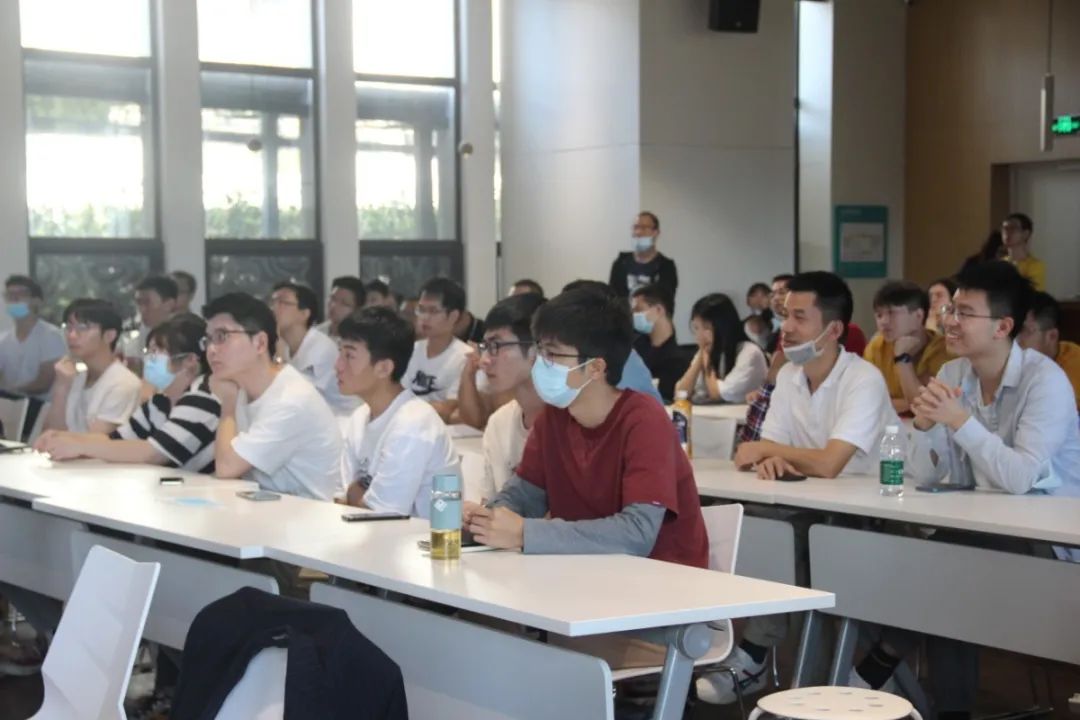
Students listening to the lecture
Chiral organic small molecule catalysis is a hotspot issue in asymmetric catalysis research. Generally, traditional chemical catalysts are small metal-containing molecules that rely on strong bonds formed by metals to promote chemical reactions. By imitating the cooperative weak bond catalysis mode commonly found in biological enzymes, Prof. Deng Li’s research group has successfully developed a series of new chiral organic small molecule catalysts and found new reactions.
The carbon-nitrogen double bond in imine is one of the most important functional groups in organic chemistry. As imines are electrophilic to carbon nucleophiles in the formation of carbon-carbon bonds, they have become the most widely used precursors for amine formation in both synthetic and biosynthetic environments. If the carbon atom of the imine can be electron-rich, the imine can react as a nucleophile instead of an electrophile, and the reversal of the electronic properties of such imines will promote the development of new chemical transformations, which will convert imines into amines through carbon-carbon bond formation reactions with carbon electrophiles and create new opportunities for effective amine synthesis.
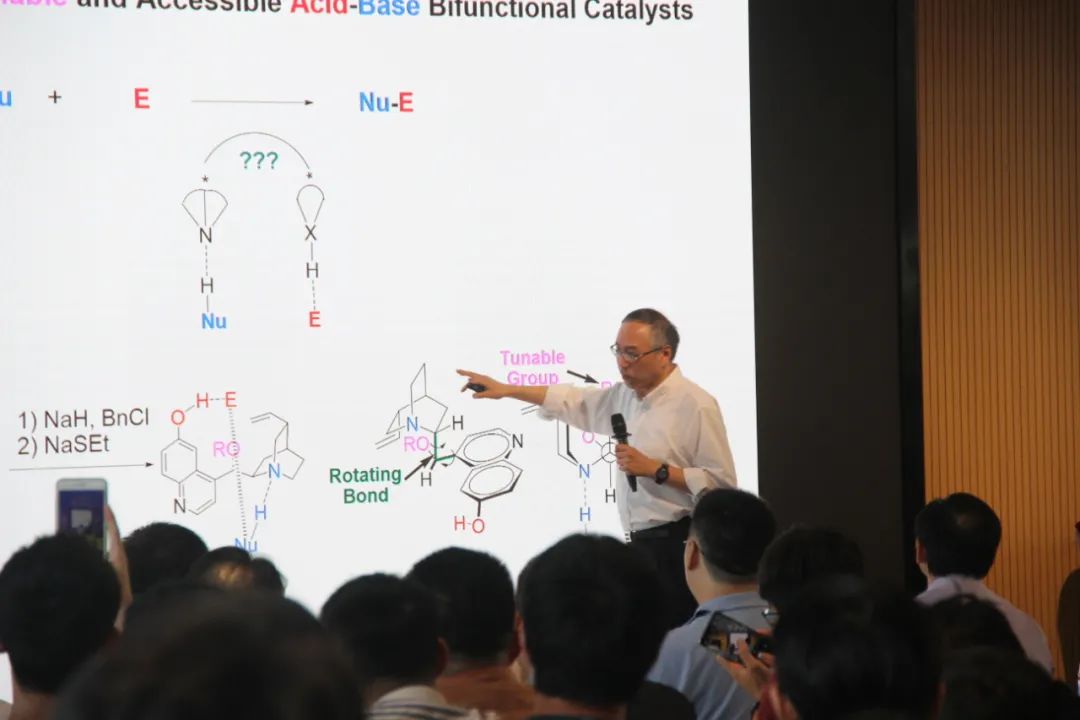
Prof. DENG is delivering the lecture
Based on this idea, the research group of Prof. DENG developed a chiral phase transfer catalyst derived from cinchona base, which help realize efficient asymmetric reaction in imine and carbon electrophilic alkenal. This reaction can tolerate a wide range of reaction substrates such as imines and alkenals, and can be carried out efficiently with even 0.01 mol% of catalyst. By further using phenol additives as proton donors, they realized an asymmetric tandem conjugated addition-protonation reaction with imine as nucleophile and α-alkyl acrolein as electrophile, and successfully controlled the chemical selectivity of the two different intermediates, producing a chiral amine with two non-adjacent stereo centers. The non-traditional imine polarity flip strategy developed by Prof. DENG provides a conceptually new and practical method for the synthesis of chiral amino compounds.
Interaction:
After the lecture, the audience had an in-depth discussion with Prof. DENG on the catalytic mechanism and prospects of organic small molecules. Finally, Prof. Minghua XU handed an honorary certificate to Prof. Deng and all the teachers presented took a group photo together.
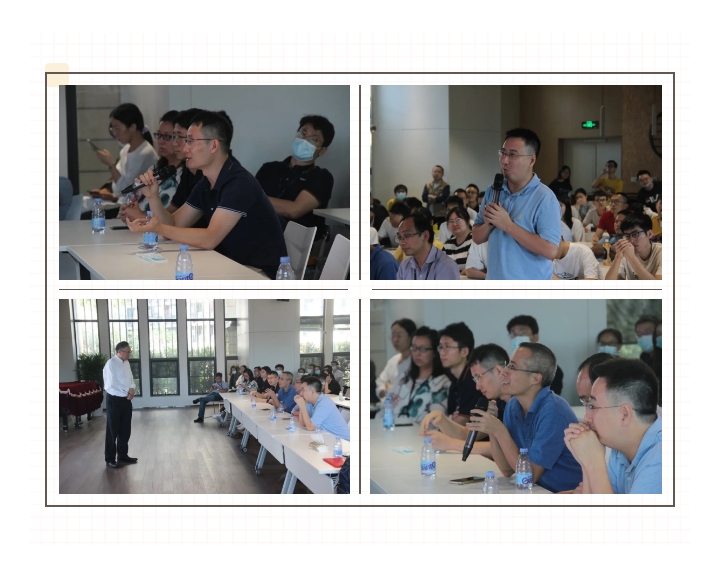
Exchanges
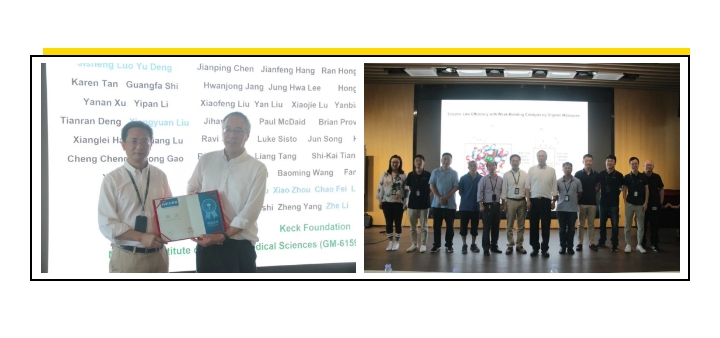
Group photos
Recommended Works:
1.Catalytic Asymmetric Umpolung Reactions of Imines. Nature, 2015/07, 523, 445-450.
2. Cinchonium Betaines as Efficient Catalysts for Asymmetric Proton Transfer Catalysis: The Development of a Practical Enantioselective Isomerization of Trifluoromethyl Imines. J. Am. Chem. Soc., 2016, 138, 12297–12302.
3.Control of Chemoselectivity in Asymmetric Tandem Reactions: Direct Synthesis of Chiral Amines Bearing Non-adjacent Stereocenters. PNAS, 2018, 115, 1730-1735.




